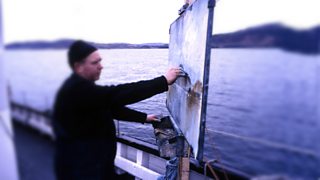Taking It All Back ���˿���
British singer and song-collector Sam Lee explores how archives around the world are seeking to repatriate sound recordings. He asks in what sense can a sound be 'taken back'.
British singer and song-collector Sam Lee explores how archives and institutions around the world are looking to repatriate sound recordings. In what sense can a sound be 'taken back'? And what is the impact on the families and communities reacquainted with the voices of their past?
What does repatriation say for the future of ethnomusicology and song-collecting? And what are the problems - legal and ethical - faced by institutions seeking to reunite sound and source? A self-described song-forager, Sam reflects on how digital technology and the opening up of archives has impacted on the practices and ethics involved in conserving and championing singing traditions and oral cultures.
Sam begins at home, London, and the archives of the British Library, amidst wax cylinders and tales of the turn-of-the-century recordists who strode out into the 'field' to document the world's oral cultures. With lead curator Janet Topp Fargion he discusses the role of recording technology in the work of salvage ethnographers and - more recently - UNESCO-driven programmes aimed at 'safeguarding intangible heritage'. The efforts of early ethnographers and enthusiasts have now become important tools for new generations of scholars, educators and musicians looking to reclaim their cultural heritage, as James Isabirye explains.
For sound curator Noel Lobley, the most exciting examples of the archive 'opening up' occur when the material is used in creative ways. He describes one project in South Africa where sound repatriation has taken on a more performative, public guise, with the Xhosa recordings of British collector Hugh Tracey being made to resonate in new contexts through the work of local DJs and promoters who took the songs from the shelves of the archive to the sound systems of the township streets.
'Taking it all back home' has come to mean something very personal for Nanobah Becker, a Navajo filmmaker who, while studying at Columbia University, discovered that the voices of her grandfather and great-grandfather were contained amongst the collection of recordings housed in the ethnomusicology department. Her knocking on the door and asking for them back began a process of cultural celebration for her whole family, and Sam travels to Window Rock in Arizona to meet three Becker generations to find out how song has been crucial to their relationship with their own history.
Last on
More episodes
Broadcasts
- Sun 3 Apr 2016 18:45���˿��� Radio 3
- Fri 4 Aug 2017 22:15���˿��� Radio 3
Featured in...
![]()
Arts
Creativity, performance, debate
![]()
Arts, Jazz & World—Words and Music
A selection of Radio 3's arts, drama, world music and jazz programmes.
What was really wrong with Beethoven?
Classical music in a strongman's Russia – has anything changed since Stalin's day?
What composer Gabriel Prokofiev and I found in Putin's Moscow...
Six Secret Smuggled Books
Six classic works of literature we wouldn't have read if they hadn't been smuggled...
Grid
Seven images inspired by the grid
World Music collector, Sir David Attenborough
The field recordings Attenborough of music performances around the world.




